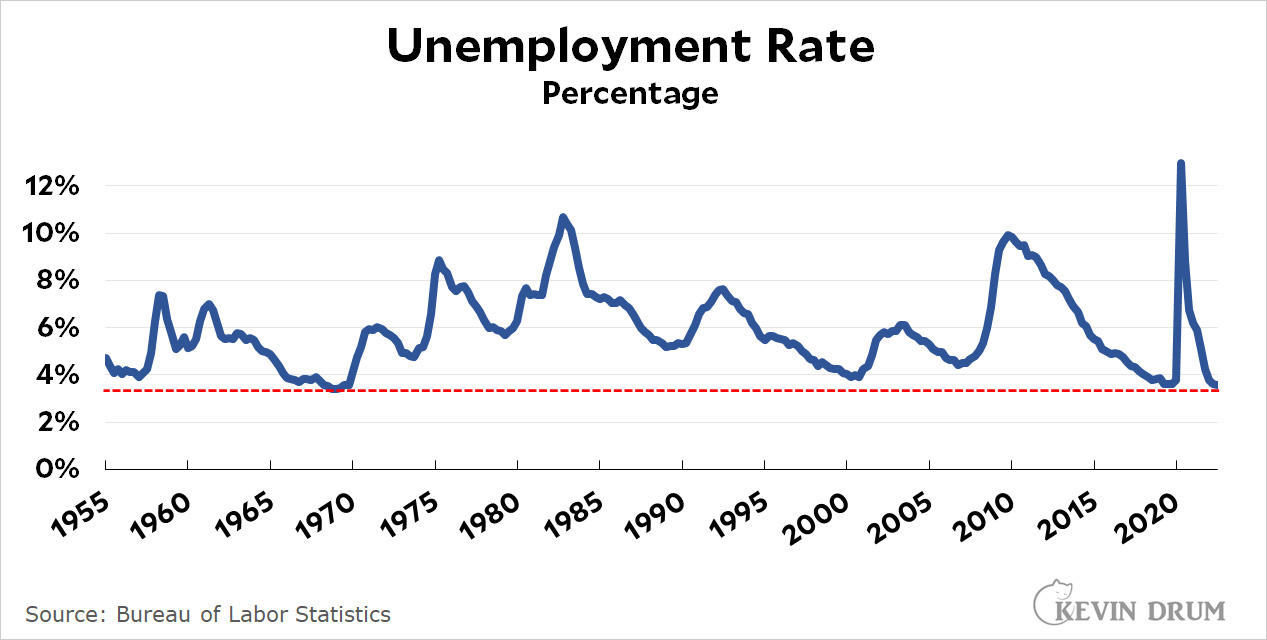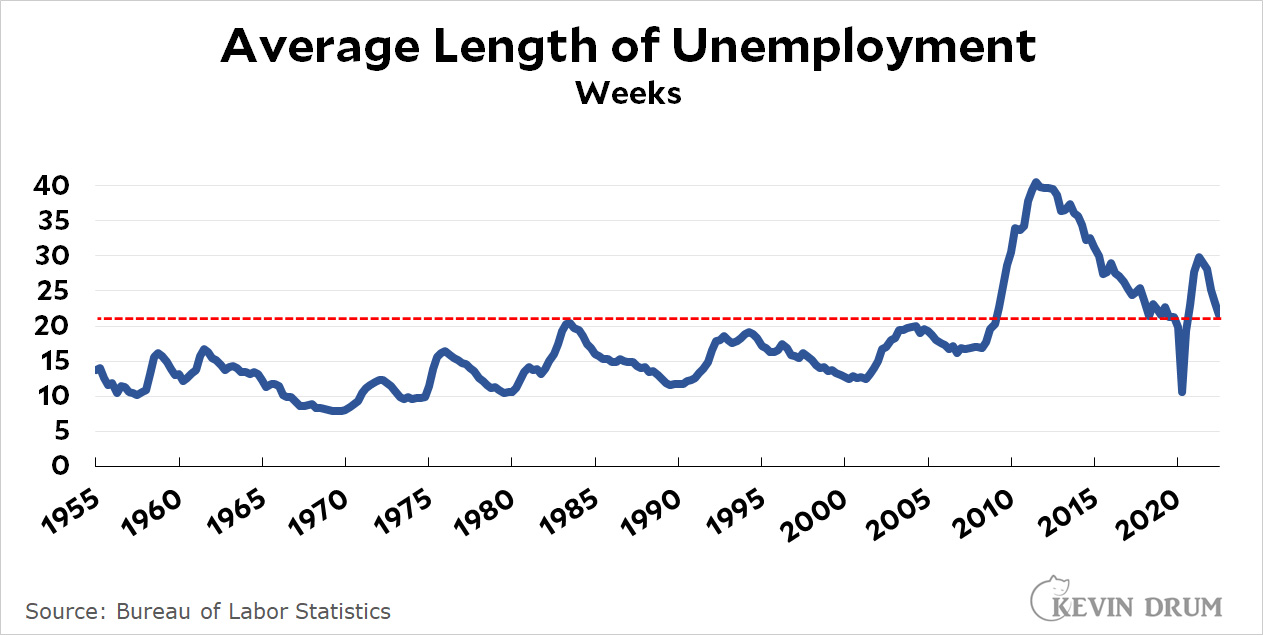After I finished looking up data for employment levels this morning I decided to browse through all the various measures of unemployment just to see if there was anything interesting there.
And there was! As you know, the headline unemployment rate has already dropped to an all-time low:
 The same is true no matter how you slice up the data: by race, by sex, by age, by type of unemployment, etc. Everything is at an all-time low. Except for one thing:
The same is true no matter how you slice up the data: by race, by sex, by age, by type of unemployment, etc. Everything is at an all-time low. Except for one thing:
 The average length of unemployment is currently about 20 weeks. This is higher than the peak of previous recessions.
The average length of unemployment is currently about 20 weeks. This is higher than the peak of previous recessions.
This might not mean anything. The average length of unemployment has been steadily increasing over the past 50 years, and it shot up to unheard-of levels during the Great Recession. Maybe it just takes longer to get back to normal these days.
Maybe. Still, the unemployment rate has been at historically low levels for the past year. Why is the average length of unemployment such a laggard?

Could it be as simple as with unemployment so low the people unemployed are going to the ones who are most unable to find a job? Either because of their skills or possible they live in a remote area with few jobs and can’t relocate?
A wild guess... with the unemployment rate at an all time low, the only people in the labor force who are unemployed are those who are almost unemployable. Anyone else who wants a job and doesn't have one, i.e. anyone else who would be classified as unemployed, is not in that situation long enough to be counted as unemployed. IIRC the household survey, the CPS, asks people questions about their situation during the week that includes the 12th of the month. If they are unemployed only for a week or two, and those weeks do not include the 12th, their unemployment spell will go unrecorded and unmeasured.
Two reasons that I'm aware of:
1) The internet has made it easier to find and apply for jobs (and remote has opened up lots of opportunities that people didn't have before). Which means that companies get a lot more applications than they used to. Which slows down the hiring process.
2) Companies themselves have made the hiring process impossible. I know someone who just went through 4 rounds of interviews for an entry level position. Why? What could they possibly gain from so many interviews? And higher level positions often require up to 8 rounds of interviews, spread over several months since it's so hard to link up everyone's calendar.
One other point. What I've seen is that lots of people now want 100% fully remote jobs. But there aren't enough fully remote positions for everyone. Here are some stats:
-A recent survey by the Society of Human Resource Management Research Institute found that 48% of people will definitely seek a remote job for their next position.
-The percentage of US workers who work remotely due to Covid, continues to decline and is now at 7.1%. (obviously, there are also people who work remotely for non-Covid reasons).
-Research from CareerBuilder found that remote positions receive 7x more job applications than in-person positions.
So one of the reasons people may be unemployed for a while is that they're holding out for something that may not be available.
Hey Kev. I'll echo previous comments with a bit of a theory:
With employment historically low and more people being hired, it is possible that folks who were previously inelgible for UI now qualify because they satisfy the work & wage requirements of the program.
Having said that, I don't have the data to prove my theory. In fact, it is far more common for workers to move in and out of employment than to truly be long-term unemployed.
Measures of unemployment do not rely on whether a person is collecting benefits or not.
Location, location, location...
A slightly different proposal than those left behind are unemployable....
Basically, there are no jobs for their skill set in their area--meaning they'd have to move to find work, but don't have the resources to move.
Adding a vote to the "companies are becoming incredibly particular" column. I've not looked for a new job for 8 years. But I dread the idea.
I'm a hiring manager (technical IC roles). When I started here, we did a minimal background check. Now we do a far more comprehensive one, do credit checks, and HMs are required to provide documentation about what references said.
On top of that, we've added screening tests for technical folks, and I don't even know what the business side does there.
Finally, you get to actual human fickleness, which seems to me has increased as well. It used to be that we'd hire people without a history of using a particular technology if they'd worked with related stuff; people seem far more demanding about exact fits now.
I do think landing a job is harder than it was a decade ago. At least, the company I work for has ramped up scrutiny and demands quite a bit from where it was when they hired me.
The system has been increasingly driven towards bias for the continuously employed, in particular, the panoply of online screening tools that discriminate so that employers can avoid the direct costs of job-training.
"On top of that, we've added screening tests for technical folks,"
My friend who got hired for an entry level position after 4 interviews....was screened for technical skills after the 3rd interview. Seriously, WTF??? Wouldn't you want to know up-front if someone has the skills do the job???
You obviously haven't looked for a job recently. This is how companies do it now. There is nothing companies hate more than payroll. So there is always an incentive to drag the process out. You can assure your over worked current employees that help is on the way but stupid HR isn't doing their job, all the while hitting your EBIDA bonuses by keeping expenses down. Add to that the religion of "data driven decisions" that never measure the time it takes to collect and tabulate the data.
Having been on the employment search and knowing many who have been recently, were well-qualified but took forever to get hired, it's one thing:
Top management of companies have put processes in place to make it as easy as possible to lay workers off but as difficult as possible to hire new workers. This gives them the benefit of having fewer workers for longer periods that impresses Wall Street and boosts stock prices.
If the main cause is management taking longer to hire, am I thinking right that we should then expect the length of unemployment level off at roughly 20 weeks? And that management was also the cause for the longer length before the Great Recession?
In addition to the other valid reasons cited, many employers believe there must be something wrong with people who've been unable to find a job in the current circumstances, even if they can't figure out what it is, and decide not to consider them without even checking their suitability.
Research into the effectiveness of Australian government programs intended to help the long-term unemployed found that those who participated in such programs actually took longer to find jobs than those who didn't. The suggested reason was that many employers regarded such participation as evidence the worker was useless. Conservatives nevertheless insist that these kinds of programs continue, given their unshakeable conviction that unemployment is a deliberate lifestyle choice, and workers can only be driven out of it by making the experience as unpleasant as possible.
I'm on the side of companies taking forever to hire. We used to joke that the ad would read, "Can you walk on water? Then you might be the person we're looking for." All the other reasons--let current staff carry the load while saying that we're looking for the best person. By the way, management always said when they finally hired someone that the new person would be stronger, had better skills, etc., than the last person. I had been at the company for a number of years, and figured that with each person being so much better than the last, that the current hire must be SuperHuman.
A) The workforce has aged, and mid career workers are probably on average pickier (and harder to place) than younger workers.
B) Mobility has decreased for a variety of reasons (spousal employment, housing affordability, etc): A reduced ability to move for a new job narrows one's options, and makes it more difficult—probably requiring more time—to find suitable employment.
C) The current, low unemployment rate means workers in many cases feel they have the ability to be pickier.
Citing Kevin:
"The average length of unemployment is currently about 20 weeks. This is higher than the peak of previous recessions.
...
Still, the unemployment rate has been at historically low levels for the past year. Why is the average length of unemployment such a laggard?"
It seems that length of unemployment is always a laggard to unemployment rate. For example, unemployment peaked in late 2009, while length of unemployment peaked only in 2011. We had brief but extremely high unemployment during 2020, and length peaked only very recently but it now on the way down.
Why the delay? One reason is that length is by definition looking backward -- the time from when someone lost their job to the current time. Another reason is that the people who have a hardest time finding new employment (due to qualifications or geography) will often be the last to get hired again. So at this point, with low unemployment, many of the remaining unemployed have been so for a long time.
Unemployment length is dropping pretty steeply, though it's slower and lagged from the unemployment rate. I'm wondering if the pandemic created a situation that's skewing the average -- there are people who still haven't been hired back since the start of the pandemic who have been unemployed for a very long time. In any time you have people at the tail end who are out of work for a long time, but the pandemic may have inflated that enough to mess up the picture. If that's the case, I would expect those numbers to fall back in line over the next year or two.
Locally and anecdotally, the pandemic shuffled people's lives and habits enough that we still seem to be adjusting to shifts in demand, even though in the overall picture things are mostly recovered.